You’ve saved your customer contact forms, archived your email conversations, and sent your transaction data to your accounts team. What’s next?
Some businesses will be overwhelmed by the quantity of data they hold. However, those who harness this information will gain valuable insights into their customer audiences and create hyper-personalized campaigns with impressive results. This guide explores six ways to transform your customer data into actionable marketing strategies, using monday CRM to keep everything organized from a single location.
Try monday CRMWhat is customer data?
Customer data refers to any type of information that businesses collect about their customers. This data contains vital clues about who your customers are, what they like, and how they behave. Using this goldmine of intel, marketers can tailor their marketing campaigns toward specific audiences and even influence product direction by responding to their needs.
Types of customer data
Customer data is a broad term encompassing the following sets of information:
Personal data
This includes personable identifiable information (PII) such as your customer’s name, address, email, phone number, date of birth, and bank details. Non-personally identifiable information (Non-PII) could refer to an IP address or device ID.
Engagement data
Engagement data reveals how customers interact with your brand’s marketing efforts. For example, you might collect data on email open rates, sales page click-through rates, social media likes, and customer service feedback scores.
Transactional data
Transactional insights focus on what products your customers buy and how often, the value of their purchases, and how they prefer to pay.
Behavioral data
Behavioral data digs deep into the purchase journey. For example, you might calculate how many clicks customers make on your website before they put an item in their cart or how long they spend on a certain page. This information is key to understanding how customers interact with your marketing efforts and what they’re looking for.
Psychographic data
Extra data about your customers’ hobbies, interests, values, and attitudes can help you personalize your marketing campaigns according to their preferences.
6 ways to leverage customer data for marketing
Collecting customer data is easy, but knowing what to do with it is a different ball game. Follow these six tips to transform raw facts and numbers into persuasive marketing that resonates with your customer base.
1. Improve your customer understanding
Successful businesses know exactly who they’re selling to, and this may evolve over time. For example, your company may initially target young professionals before realizing that stay-at-home parents are also attracted to your brand. By analyzing your data, you can segment each group and create separate marketing campaigns that appeal to each segment.
Alternatively, you may notice many customers abandoning their carts before checkout, which happens in 70.19% of buyer journeys. By diving into behavioral data, you may discover and address a common pain point in your marketing to increase conversions.
2. Design strategic marketing campaigns
The best marketing campaigns are tailored in both the message and the offering to appeal to customers’ needs and wants. Let’s say your retail business sells footwear and fashion accessories. By analyzing your transactional and behavioral data, you can send personalized recommendations about what your customer might want to purchase next.
For example, if a customer recently bought a pair of shoes, you can email them suggesting matching accessories such as bags or jewelry. This approach could increase sales and create a personalized and positive customer experience.
3. Optimize product and service development
A study of a Swedish clean-tech company explored the idea that traditional marketing creates passive customers who are merely buyers and users of specific products. The study concluded that inviting customers to participate in new product development promotes creative ideas that add more value to a product.
When customers respond to surveys, send queries to your sales teams, or raise a complaint, this data can influence the future of your product and service offerings. Customers might suggest a new feature update or create such demand that a launch schedule is brought forward. Listen to your customers rather than prescribe what you think they’re looking for.
4. Achieve greater customer satisfaction and retention
When companies use their data to customize their marketing and tailor their offerings, their audience is likelier to hang around. Digiday’s “State of Personalization in Email Marketing” report found that 49% of marketers consider customer loyalty the top reason to personalize their campaigns. The great news? It works. SmarterHQ reports that 80% of frequent shoppers only purchase from brands that tailor their business.
5. Make smarter decisions
While some of your customer data is current, such as their name, address, and gender, other information, like your transactional data, is historic—it’s based on purchases your customers made last week, month, or year. Companies can lean on this data to anticipate future trends. Let’s say you noticed a huge sales spike in November last year, in the run-up to the holiday season. This intel allows you to craft personalized marketing campaigns at the same point this year.
6. Increase operational efficiency
Storing your customer data in a central location like monday CRM ensures that multiple teams can access it to make more informed decisions faster. For example, your sales team can use engagement data to tailor their approach to potential clients. Similarly, your customer service team can resolve issues more quickly by accessing a customer’s purchase history to retain their business.
Try monday CRMManage valuable customer data in monday CRM
monday CRM streamlines all your customer data from a central location, enabling marketers, sales pros, and business owners to manage their entire sales cycle from pre- to post-sales. Here are the specific features you’ll love when personalizing your marketing campaigns:
- Customizable dashboard: monday CRM allows you to view your customer data every which way you need from your customizable dashboard. Choose from 27+ views, 36+ columns, and 25+ widgets to give you the most important information at a glance, then drill down into the specifics as required.
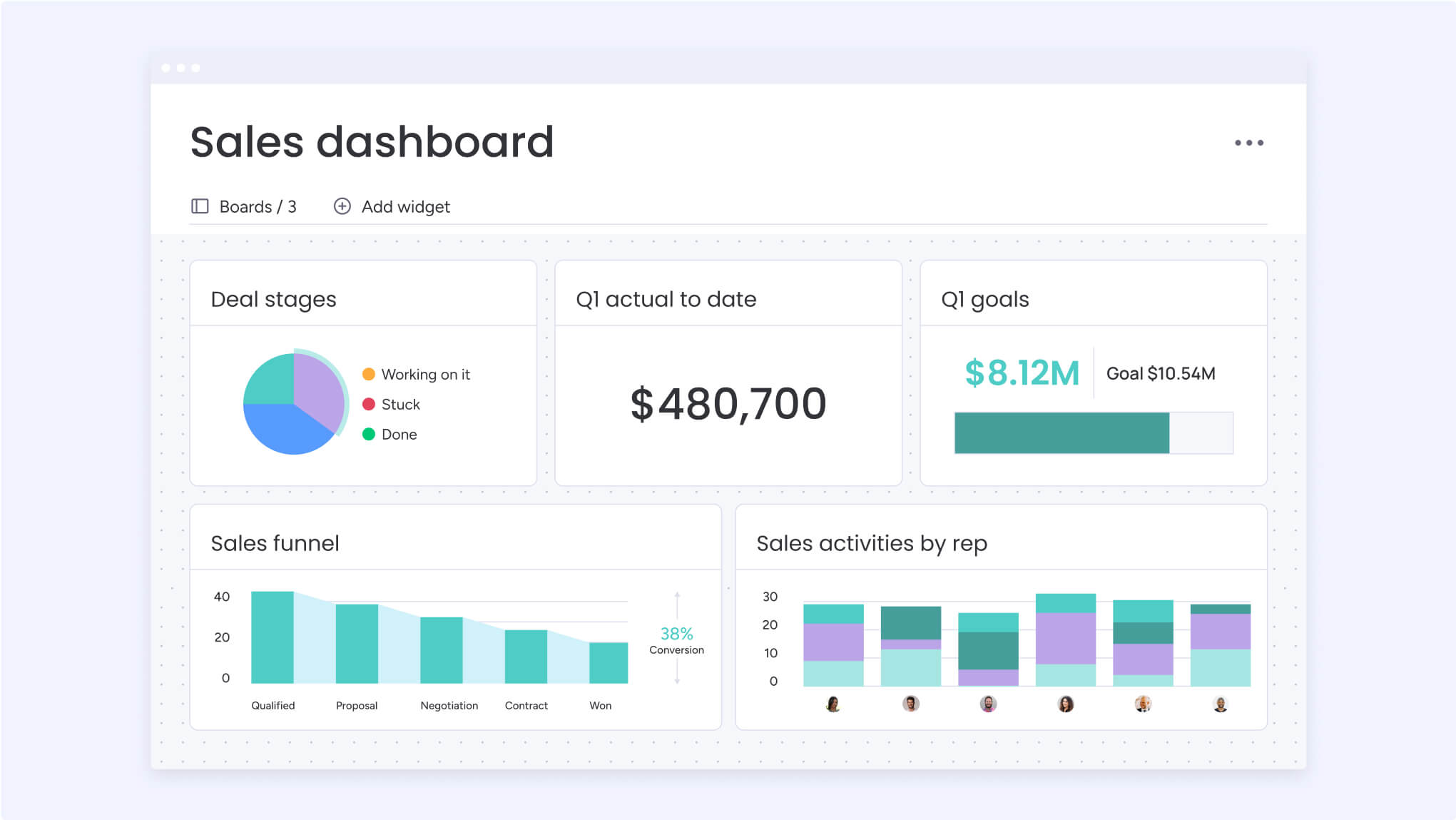
- Collaboration: Sales, marketing, and product development teams need to work together to understand what their customers want and how they’re responding to various marketing and outreach efforts. Your teams can come together in Monday CRM to provide key updates on board items or track important email or Slack discussions to keep all your communications in one place.
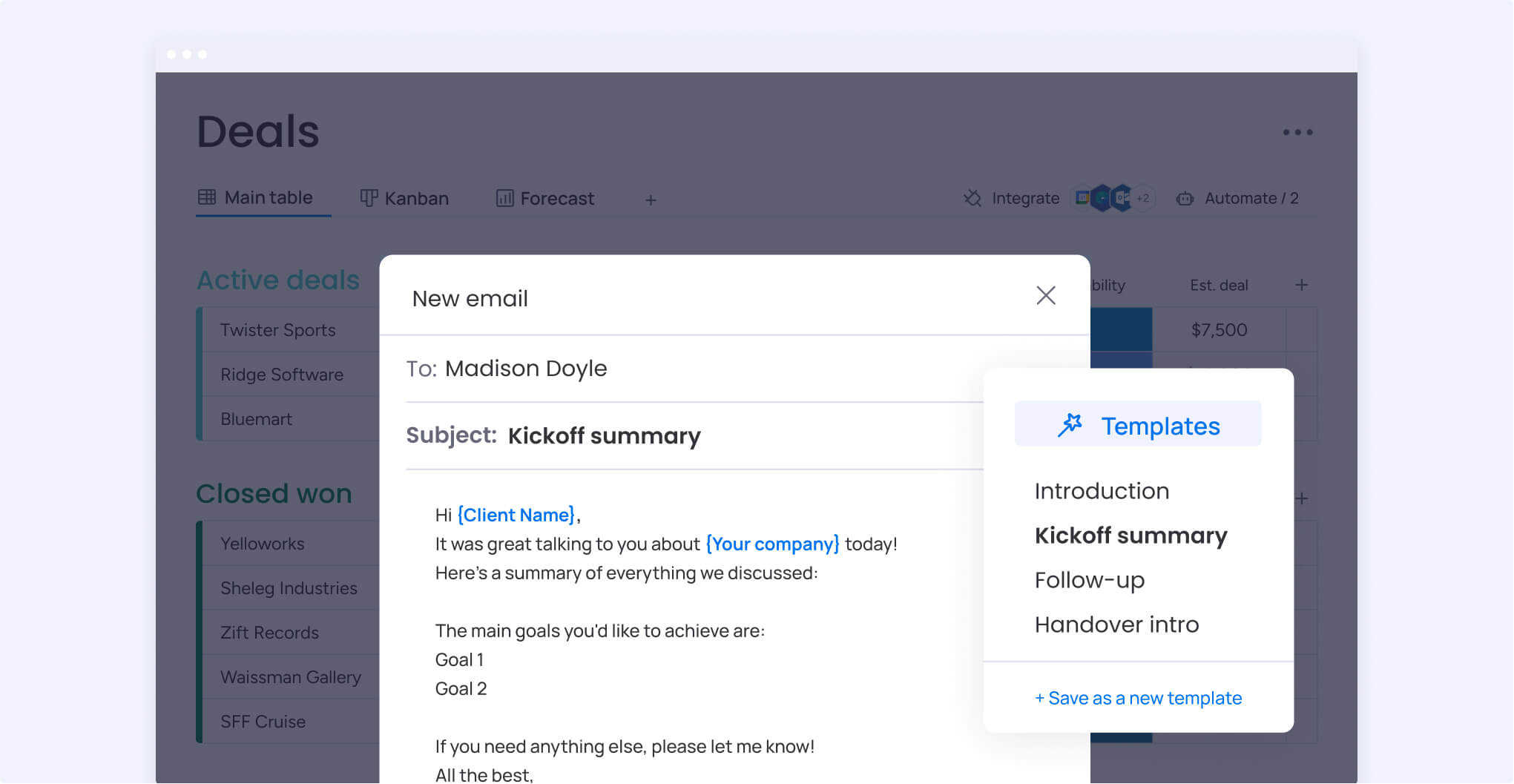
- Lead management: Every customer starts life as a lead—a person who is interested in your brand but has yet to commit. monday CRM makes it easy to capture lead data by adding forms to your website or receiving notifications when a lead opens your email or replies to your outreach.
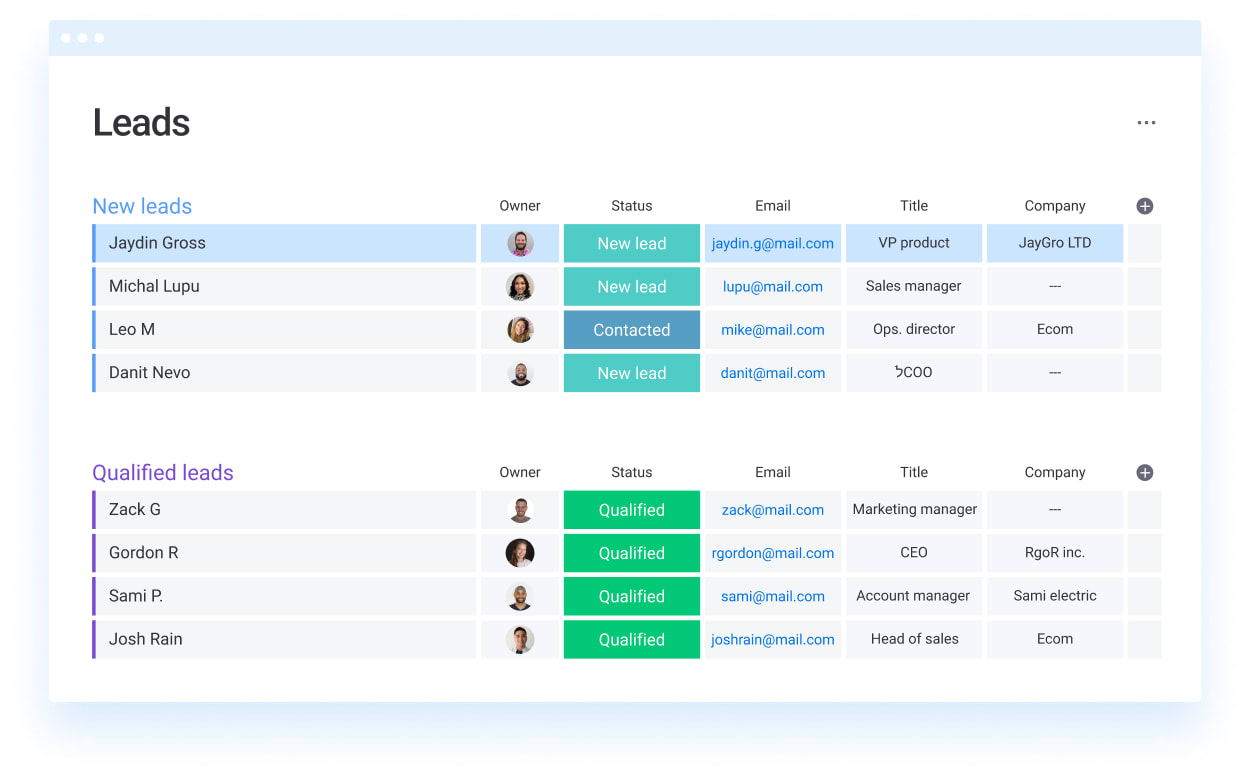
- monday AI: Our mass email feature makes it easy to whip up personalized bulk emails to sections of your customer base, significantly reducing your time.
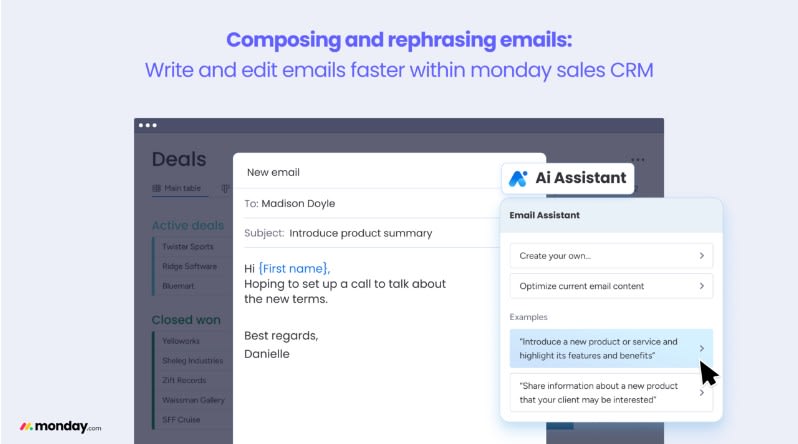
- Integrations: Your customer data probably exists everywhere, from email and CRM software to eCommerce and social media platforms. monday CRM integrates with over 72+ apps, so you can pull all that data into a single location, where it’s easier to analyze and act upon.
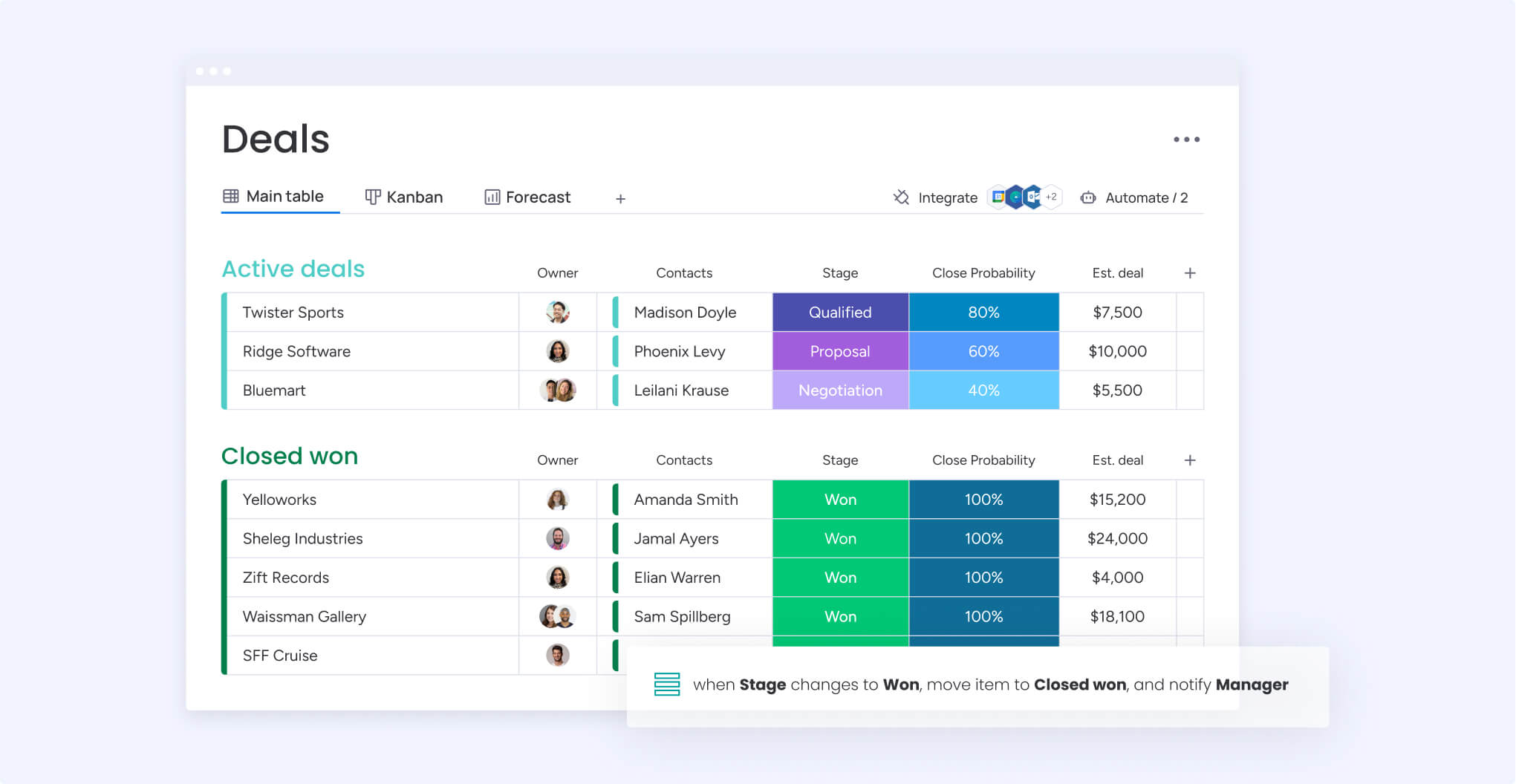
Australian real estate franchise Ray White switched to monday CRM after becoming frustrated with other customer relationship management platforms. Operations Manager Kyle Dorman explains,
“We were able to customize the CRM to fit the needs and requirements of our day-to-day activities. We ended up doing up to 1,300 automations and integrations which we could use to set out the next two to three years of automated emails, notifications and prompts to our team to follow up in certain steps. We’re doing that for 2,000 clients at the click of a finger.”
Ready to streamline your approach to customer data? monday CRM is a fully customizable platform with everything your teams need to appeal to your customer base. Get started with a free trial today.
Try monday CRMFAQs
What is a customer data platform?
A customer data platform is a centralized software that collects and manages all customer data from various sources, such as email marketing, social media, eCommerce platforms, and more. It allows businesses to store and analyze this data to gain insights into their customers' behaviors and preferences.
What is customer data management?
Customer data management makes sense of the vast quantities of information you have about customers. It involves collecting, organizing, and analyzing customer data to understand their behavior and preferences and make more informed decisions.
What data should you collect from your customers?
Businesses should collect a broad range of customer data, including basic demographic information like name, age, and location, along with specific data like purchase history, browsing behavior, and marketing campaign engagement. This data provides valuable insights into customer preferences and helps businesses tailor their offerings. Always remember that customer data is sensitive and confidential, meaning you must handle it carefully and adhere to data privacy laws.

